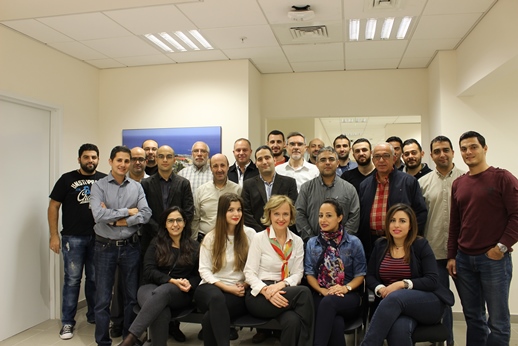Welcome to the Department of Medical Engineering at AUBMC, where our primary goal is to improve human health through proper, modern healthcare, excellence in research, and superior education by integrating the sciences of engineering and medicine.
Medical engineering (has several other names among which are biomedical engineering and clinical engineering) is a relative newcomer to the field of medicine. However, as man recognized disease, he also recognized the need for tools (technologies) and tricks of the trade to deal with the secrets of the human body.
Over time, healthcare technology has become one of the most important forms of technology in any society. Everyone has some experience with it through birth, illness, and aging. In fact, without the technology that we have today, the healthcare system has almost nothing to offer the sick and distressed, except supportive care.
The word technology is derived from the Greek word “techne” or tool. However, the officially recognized definition of healthcare technology is: drugs, devices, and medical and surgical procedures used in healthcare and organizational and supportive systems within which such care is provided. This definition also includes both the hardware and the software. As such, a hospital can be considered as a technology, as well as a healthcare system.
We, at the Department of Medical Engineering, have defined our mission statement along the above broad definition of healthcare technology, while taking into account the fact that it must also attend to the research and teaching needs of an academic institution. In doing so, we also took into account the important factors needed to do appropriate, proper, safe, and cost-effective technology transfer.
We are proud of our reputation which has been built over time and hope that in the coming years, we will continue to break new ground in this fascinating field and look forward to serving our communities with cost-effective and timely solutions for today’s rapidly changing, healthcare environment, while staying at the cutting edge of education and research.
Bassam Tabshouri, Director
Department of Medical Engineering
American University of Beirut Medical Center
Meet Us

Our Experience
The field of clinical engineering started in 1967 under a variety of labels, such as biomedical or medical engineering. The American University of Beirut Medical Center (AUBMC) Scientific Equipment Center (SEC), founded in 1968 to support scientific research at the Medical School, was later renamed in 1979 as the “Medical Engineering Department” and entrusted with the additional support of clinical equipment at AUBMC.
By virtue of the unique nature and location of AUBMC as an American institution located in Lebanon and serving the Middle East region, the department was able to acquire, over the years, valuable experience being required to adopt US and international standards in a region with limited technical and financial resources.
Due to these unique and varied capabilities, we have been called upon to consult and execute projects outside the institution, both locally and regionally.

"Experience and experts are related words derived from the Latin verb: to put to test."
The Challenge
Today, the healthcare industry is undergoing significant changes in terms of knowledge and new technologies which are highly specialized. These changes are raising complex moral and ethical issues, in addition to the issue of dealing with the healthcare expenditures which are increasing.
Healthcare centers are challenged to provide affordable and efficient access to quality healthcare while taking advantage of technology breakthroughs for improved health and quality of life.
In addition to the fore-mentioned points, the Department of Medical Engineering at the American University of Beirut Medical Center (AUBMC) has dealt with:
the high international standards that AUBMC and the Faculty of Medicine at AUB aim to maintain in a developing country in terms of patient care, education, and research
full responsibility of servicing all the medical equipment at AUBMC during war times without relying on any local support
However, our biggest challenge has been making the above ends meet and building our expertise using our resources in a cost-effective manner.
The Solution
Technology has become part and parcel of any accredited healthcare system. However, with only a handful of more than 10,000 new medical technologies appearing on the market each year, hospitals may, without expert help and advice, end up spending large sums of money on ineffective technologies and equipment.
This is why it is crucial to properly attend to and develop programs whereby biomedical engineers are involved in:
-
Technology Transfer - With Management Processes and Systems
- Assessment of new or existing technologies
- Planning of facilities (including budgeting)
- Development of policies, procedures, and administrative systems
- Development of bid specifications and evaluation of bids
- Purchasing negotiations
- Equipment-specific site planning and equipment installations
- Advising on software systems for laboratory, radiology, medical records, scheduling, etc...
-
Technology Management Services
- Development and implementation of systems to meet international and/or local standards
- Implementation of equipment management and maintenance programs/softwares
- Balancing in-house vs. outside maintenance and service agreements
- Negotiation of service agreements
- Development of safety programs
- Development of calibration protocols
- Training of nursing staff and support teams on the proper use and care of equipment
- Training of biomedical engineers and technicians
- Technology management and transfer practices for administrators and clinical and nursing senior management
- Training on electrical safety
- Specific technology presentations to medical and nursing staff
-
Medical and Basic Science Research
- Participating in medical or basic science procedures/experiments
- Modifying existing equipment for special research purposes
- Designing new equipment for special research purposes
